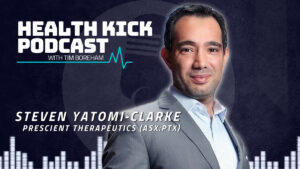Prescient Therapeutics is hoping to follow in the footsteps of Neuren Pharmaceuticals after positive results from its latest Phase 1b clinical trial.
Prescient Therapeutics (ASX:PTX) will seek approval from the US Food and Drug Administration (FDA) for an accelerated approval study after its Phase 1b clinical trial of PTX-100 in relapsed and refractory T-cell lymphomas (TCL) showed encouraging results.
While the primary goal of the study is to evaluate safety, PTX CEO and MD, Steven Yatomi-Clarke said targeted therapy PTX-100 continues to exhibit encouraging clinical activity in the difficult-to-treat patient population.
“The study has demonstrated several positive clinical responses especially when considered against responses expected from current standards of care,” he said.
“Unfortunately, in this patient population less than a third will respond to current therapies,” Yatomi-Clarke said.
“For those that do respond the expected duration of that response is unfortunately only three to four months.”
However, Yatomi-Clarke said what they are seeing with the PTX-100 study, albeit small numbers, is a response rate of 40% lasting on average nine months.
He said responses include two patients with relapsed and refractory peripheral TCL (PTCL) that have had complete responses (complete eradication of cancer) since the prior update in November.
These responses are not generally expected in PTCL.
“The third who have a response normally see their tumours shrink or stabilise but a complete response is unusual,” Yatomi-Clarke said.
“It looks to be doing something quite exciting and beyond our expectations.”
While they normally would roll into a Phase 2 study, PTX have been advised by their regulatory advisors to recruit a small number of patients (seven or so) with different types of TCL.
“The data is early, but hopefully if it continues on trend, the expanded cohort of patients will give us the data robust enough to go the FDA and say we think our next Phase II trial should be an accelerated approval trial,” Yatomi-Clarke said.
Meanwhile, PTX-100 continues to exhibit an excellentsafety profile at the highest dose of 2,000 mg/m2, with very few serious adverse events.
Following in the footsteps of Neuren
Given the stunning rise of Neuren Pharmaceuticals (ASX:NEU) recently, which this month had its compound trofinetide for Rett’s syndrome, the first drug for the treatment of the rare neurological disorder which emerges in infancy, , investors are seeking out the “next Neuren”. Some observers have drawn parallels between PTX and where Neuren was not long ago.,
“The PTX-100 study is showing data which is sufficiently encouraging for us now to go to the FDA to see approval for our next study to be an Accelerated Approval study,” Yatomi-Clarke said.
“If we get an Accelerated Approval, it will be a huge catalyst for the company because it means if you meet your endpoints at the end of the Phase 2 you can potentially start selling the drug.
“If not granted it will be a regular Phase 2 trial, which will still be fantastic.”
Yatomi-Clarke said a Phase 3 trial is still needed but that this can occur simultaneously whilst the company is marketing the drug. A Phase 3 trial studies the efficacy of a treatment in a larger cohort of patients and are also used to monitor adverse effects.
Expanded orphan drug approval
In further good news, PTX has recently been granted additional Orphan Drug Designation (ODD) for PTX-100 to treat all different types of TCL from the FDA.
The ODD was for a broader indication than PTX requested and encompasses all TCLs – a group of lymphomas that develop when a group of white blood cells called lymphocytes grow out of control.
There are different groups of TCL; CTCL and Peripheral T-cell lymphoma (PCTL), each with several distinct subtypes.
Collectively, TCLs represent an area of unmet or poorly-met patient need, especially in patients with relapsed or refractory disease.
The granted ODD covers all TCLs and their subtypes, providing PTX guaranteed market exclusivity of seven years.
“We applied for a certain type of T-cell lymphoma, but the FDA overreached and granted us orphan drug destination for them all which we did not expect but is very good for us,” Yatomi-Clarke said.
“Orphan diseases are rarer diseases and in order to encourage companies to develop drugs for these rarer diseases the FDA creates incentives. Maybe the most valuable one is guaranteeing you seven years market exclusivity once approved.”
Well-funded for tough market
Yatomi-Clarke said there is no doubt that market conditions have changed dramatically with higher interest rates, inflation, geopolitical tensions and now uncertainty among global banks.
However, PTX and its partners continue to demonstrate how its CAR platforms (Chimeric Antigen Response) overcome the challenges of current first generation CAR-T treatments to be able to bring cutting-edge therapies to more patients and more types of cancer.
Several of its OmniCAR programs are now advancing through several important preclinical proof of concept trials, as PTX progresses this next-generation cell therapy platform.
“It is a very tough market,” he said.
“We have some exciting platforms but what the market is basically screaming out now is that investors are risk averse and shying away from earlier stage riskier assets to those that are more mature.
“But our CAR-T cell therapies are still being progressed and we certainly have enough cash to keep all our programs going.”
Yatomi-Clarke said the light is being shone on PTX-100 because of the later stage of its development.
“We are staying the course,” he said.
“Cancer doesn’t know what the market is doing and the fact we have patients walking around because of our trial is not lost on us.”
This article was developed in collaboration with Prescient Therapeutics, a Stockhead advertiser at the time of publishing.
This article does not constitute financial product advice. You should consider obtaining independent advice before making any financial decisions.
You might be interested in












